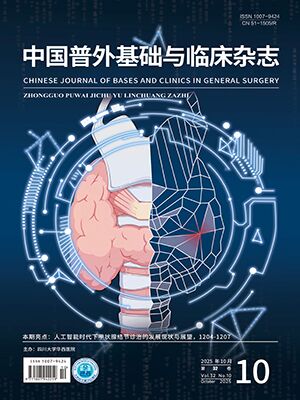Objective To observe the expression levels of nuclear factor kappa B (NF-κB), vascular endothelial growth factor (VEGF), and CD31 in portal vein and surrounding tissues of rats during the formation process of cavernous
transformation of portal vein (CTPV), and try to search the relationship between NF-κB, VEGF, and the angiogenesis
of portal areas, as well as the significance and the role of NF-κB and VEGF in the formation process of CTPV.
Methods One hundred and ten Sprague-Dawley (SD) rats were randomly (random number method) divided into sham operation group and model group. The partial constriction operations on portal vein were performed in model rats with a blunt 21G
caliber to establish CTPV animal models (model group), while the exploratory operations on portal vein, not constriction,
were performed in rats of sham operation group. All specimens (portal vein and surrounding tissues) were fixed in formalin
and made into paraffin blocks. Each specimen was tested by immunohistochemistry for the expressions of NF-κB, VEGF, and CD31, then optical density (OD) of NF-κB expression and the mean integral optical density (IOD) of VEGF expression
were measured by using Image Pro Plus 6.0 software, and microvessel density (MVD) was calculated under microscope.
Results Nucleoplasm ratio of OD value of NF-κB, mean IOD value of VEGF, and MVD value in 1, 2, 3, 4, and 6 weeks after operation didn’t significantly differed from that of before operation in sham operation group (P>0.05), but higher at all time points after operation in model group (P<0.01). Compared with sham operation group, nucleoplasm ratio of OD value of NF-κB, mean IOD value of VEGF, and MVD value were significantly higher in 1, 2, 3, 4, and 6 weeks after operation in model group (P<0.01). NF-κB and VEGF, NF-κB and MVD, VEGF and MVD were positively correlated with each other (r=0.654 6,P<0.01;r=0.620 7, P<0.01;r=0.636 9, P<0.01) in model group.
Conclusion NF-κB and VEGF may relate to the formation of CTPV, and may involve in the angiogenesis.
Citation: MAO Jianxiong,LIU Lei,LI Suyi,WANG Bin,WANG Jianyao. Expressions of NF-κB and VEGF in The Formation of Cavernous Transformation of Portal Vein in Rats. CHINESE JOURNAL OF BASES AND CLINICS IN GENERAL SURGERY, 2013, 20(3): 280-286. doi: Copy
Copyright © the editorial department of CHINESE JOURNAL OF BASES AND CLINICS IN GENERAL SURGERY of West China Medical Publisher. All rights reserved
-
Previous Article
Impact of Preoperative Renal Dysfunction on Outcomes of Cardiac Surgery and Risk Factor Analysis -
Next Article
儿童支气管黏液表皮样癌一例




